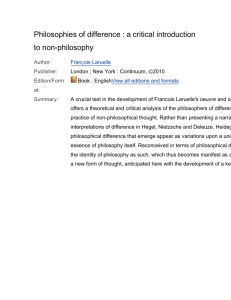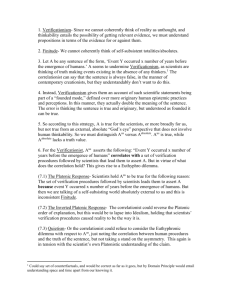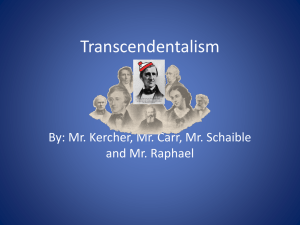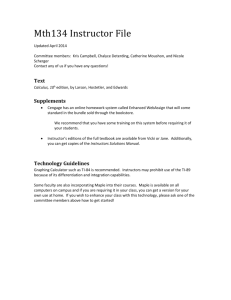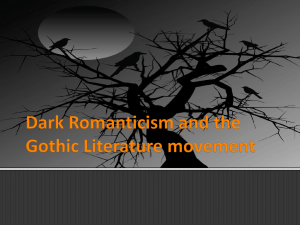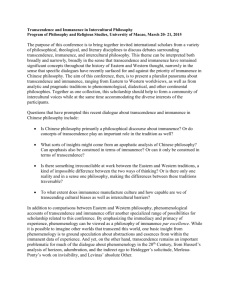Two Ontologies of Materialism: From Non
advertisement
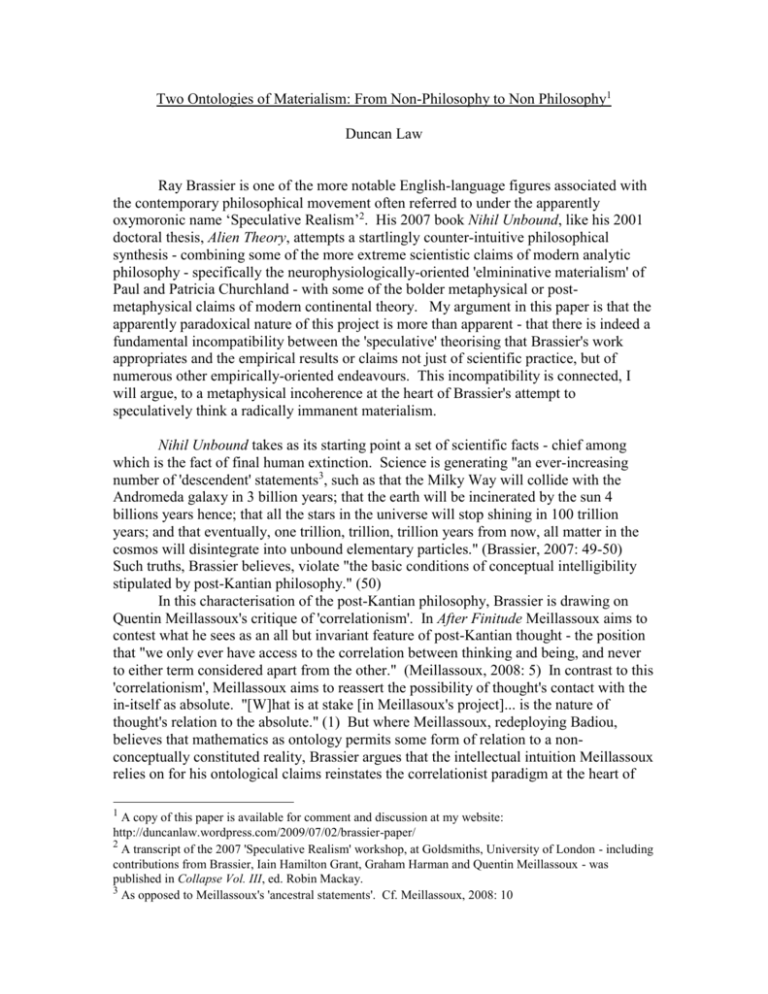
Two Ontologies of Materialism: From Non-Philosophy to Non Philosophy1 Duncan Law Ray Brassier is one of the more notable English-language figures associated with the contemporary philosophical movement often referred to under the apparently oxymoronic name ‘Speculative Realism’2. His 2007 book Nihil Unbound, like his 2001 doctoral thesis, Alien Theory, attempts a startlingly counter-intuitive philosophical synthesis - combining some of the more extreme scientistic claims of modern analytic philosophy - specifically the neurophysiologically-oriented 'elmininative materialism' of Paul and Patricia Churchland - with some of the bolder metaphysical or postmetaphysical claims of modern continental theory. My argument in this paper is that the apparently paradoxical nature of this project is more than apparent - that there is indeed a fundamental incompatibility between the 'speculative' theorising that Brassier's work appropriates and the empirical results or claims not just of scientific practice, but of numerous other empirically-oriented endeavours. This incompatibility is connected, I will argue, to a metaphysical incoherence at the heart of Brassier's attempt to speculatively think a radically immanent materialism. Nihil Unbound takes as its starting point a set of scientific facts - chief among which is the fact of final human extinction. Science is generating "an ever-increasing number of 'descendent' statements3, such as that the Milky Way will collide with the Andromeda galaxy in 3 billion years; that the earth will be incinerated by the sun 4 billions years hence; that all the stars in the universe will stop shining in 100 trillion years; and that eventually, one trillion, trillion, trillion years from now, all matter in the cosmos will disintegrate into unbound elementary particles." (Brassier, 2007: 49-50) Such truths, Brassier believes, violate "the basic conditions of conceptual intelligibility stipulated by post-Kantian philosophy." (50) In this characterisation of the post-Kantian philosophy, Brassier is drawing on Quentin Meillassoux's critique of 'correlationism'. In After Finitude Meillassoux aims to contest what he sees as an all but invariant feature of post-Kantian thought - the position that "we only ever have access to the correlation between thinking and being, and never to either term considered apart from the other." (Meillassoux, 2008: 5) In contrast to this 'correlationism', Meillassoux aims to reassert the possibility of thought's contact with the in-itself as absolute. "[W]hat is at stake [in Meillasoux's project]... is the nature of thought's relation to the absolute." (1) But where Meillassoux, redeploying Badiou, believes that mathematics as ontology permits some form of relation to a nonconceptually constituted reality, Brassier argues that the intellectual intuition Meillassoux relies on for his ontological claims reinstates the correlationist paradigm at the heart of 1 A copy of this paper is available for comment and discussion at my website: http://duncanlaw.wordpress.com/2009/07/02/brassier-paper/ 2 A transcript of the 2007 'Speculative Realism' workshop, at Goldsmiths, University of London - including contributions from Brassier, Iain Hamilton Grant, Graham Harman and Quentin Meillassoux - was published in Collapse Vol. III, ed. Robin Mackay. 3 As opposed to Meillassoux's 'ancestral statements'. Cf. Meillassoux, 2008: 10 his would-be speculative materialism. For Brassier, a more radical theoretical manoeuvre is required in order to escape the correlationist paradigm, and this manoeuvre is, he believes, to be found in the ‘nonphilosophical’ thought of Francois Laruelle. There are, however, two crucial areas in which Brassier - at least in Nihil Unbound - is critical of Laruelle, and before discussing his appropriation of non-philosophy I want to briefly summarise these differences. In the first place: Brassier criticises Laruelle's attempt to homogenise all past and future philosophy into the single fundamental paradigm Laruelle calls philosophical Decision. Laruelle privileges the Kantian problematic as the structure that underlies all philosophical thought - in Brassier's words: "every philosophical Decision recapitulates the formal structure of a transcendental deduction... [the transcendental method] represents a methodological invariant for philosophy both before and after Kant." (2007: 123; 2001: 120) For Brassier this is a “gratuitous assumption”: “Laruelle can simple drop the exorbitant claim that his account of decision is a description of philosophy tout court” (2007: 134) - rather, it is an account of 'correlationism'. In the second place Brassier condemns Laruelle's insistence on identifying the Real as One or Vision-in-One or One-in-One (in Laruelle's terms) with the apparently newly discovered transcendental subject Laruelle calls 'Man'. This identification, Brassier argues, not only reinstates anthropocentrism - it does so in a manner hard to distinguish from solipsism. With these criticisms borne in mind, Brassier believes that Laruelle’s account of philosophy as Decision can be used to extend and fully realise Meillassoux’s critique of correlationism. The first step in this critique is the analysis of correlationism as Decision - i.e. as a philosophical structure characterised by the following three features: 1) In the first place a conditioned datum - for example experience - which is 'given' to philosophical subjectivity, apparently from outside it. 2) In the second place, this datum's condition as a priori factum - for example, in the Kantian paradigm that Laruelle privileges, the categories as transcendental conditions of experience. 3) Finally, a synthetic unity wherein condition and conditioned are conjoined, which is in turn the condition of possibility of the contact between, and reciprocal relation of, datum and factum, transcendental and empirical. This is the transcendental binding of transcendental and empirical - the transcendental condition of transcendental thought, as radical immanence. Now within this structure of transcendental deduction, the concept of immanence plays a double role. As Brassier puts it: "a philosophical Decision is a Dyad of immanence and transcendence, but one wherein immanence features twice, its internal structure subdivided between an empirical and a transcendental function." (2001:115116) Which is to say: the empirical object is immanent to the plane of the empirical subject, which plane is both transcended and constituted by the transcendental subject. Yet both transcendental subject as location of a priori factum and empirical object as given a posteriori datum must themselves be immanent to a more general synthetic activity or plane which enables the relation of datum and factum, of transcendental and empirical. It is this third moment or level - the larger immanence of immanence and transcendence - which forms the focus of non-philosophical enquiry. Brassier's non-philosophical critique of correlationism takes this immanent plane as its starting point. The correlationist error, Brassier believes, is in the identification of the production of the overarching plane of immanence with the constituting activity of the transcendental subject. Transcendental immanence - radical immanence - while necessarily posited by transcendental thought as one of its conditions of possibility, is, in this very positing, tied to the transcendental subject as one of the aspects of its empiricalworld-constituting activity. Any philosophical attempt to think radical immanence thereby covertly renders immanence transcendent. For Brassier, then, it is essential to think the overarching plane of immanence in a way that does not tie its existence to the act of thinking. This necessity is realised - or revealed as already-realised - in the non-philosophical move of unilateralisation. In Brassier's words: "the 'perspective' of radical immanence (the vision-in-One) is already-givenwithout-givenness, prior to every auto-positional or auto-donational hybridisation of given and givenness, empirical and a priori, real and ideal." (2001: 129) And: the "effectuation of immanence's foreclosure to Decision in non-Decisional thought [i.e. nonphilosophical thought], or Decision's determination-in-the-last-instance through the nonDecisional effectuation of immanence in thought, is what Laruelle calls 'cloning'" (130). Given-without-givenness therefore guarantees the radically immanent Real's nonconstitution by the transcendental subject, while the non-philosophical operation of 'cloning' guarantees non-philosophical thought's lack of complicity in philosophical Decision. We have here, then, two apparent unilateral relations - non-philosophy's unilateral separation of itself from philosophy mirrors the Real's unilateral determination of thought. And this poses a question: what is the relation between the non-philosophical subject and the Real of radical immanence? And: how, for Brassier, can this relation be understood in a way that does not reinstall philosophical or correlationist reciprocity? For Laruelle, and for Brassier, even a relation philosophically understood as unilateral is always in danger of being reconstituted as reciprocal in the transcendental subject's positing of unilaterality. So: what is the relation between non-philosophical thought and the Real? I want to suggest that there are three basic answers to this question in the nonphilosophical corpus - in Laruelle and Brassier's work - and that they are all very problematic. In the first place one can simply posit the identity of the Real with nonphilosophical thought. And this is what Laruelle does when he identifies the One or Vision-in-One or One-in-One as Real with Man. "Man is precisely the Real foreclosed to philosophy". (Laruelle, 2009: 30) And of course Brassier rejects this as anthropocentric and solipsistic. In the second place, and this is the move that Brassier apparently endorses in Alien Theory, one can posit a relation between non-philosophical thought and the real that is unmediated by the philosophical Dyad of immanence and transcendence. This cannot be a form of intellectual intuition - for the reasons articulated by Brassier in his critique of Meillassoux - and it also cannot be any form of empirical relation, since the empirical, within this transcendental schema, is understood as constituted by the transcendental subject. So, in Brassier's words, an object encountered from the perspective of a nonphilosophical subject "will only become manifest according to the strictures of a nonempirical, non-intuitive, or theoretically determined phenomenality, as opposed to those of consciousness, sensibility, or being-in-the world." (2001: 167) Now these are extremely stringent restrictions on our understanding of the relation between non-philosophical thought and the Real. Indeed these restrictions are so stringent that, in my opinion, it is hard to see how this relation could be understood as anything other than mystical. And, in fact, both Laruelle and Brassier will explicitly describe our knowledge of the Real in mystical terms - specifically in terms of gnosticism. Laruelle writes: "the gnosis of ‘matter‘, the otherwise-than-materialist gnosis of the dispersive real, must be sought beyond materialism and the hyle." (2001: 39) Or, elsewhere: “it is not a question of a secularization - still rational and transcendent - of an extraordinary experience, but of the possibility of rendering the usage of an exceptional or superhuman experience in every ‘ordinary man’ which was supposed to be refused to him. Philosophy is this organon, this a priori form which, giving us the World, forecloses the mystical experience which intrinsically constitutes humans...“ (2009: 58) Finally Brassier: "Non-materialism reduces or suspends what Laruelle refers to as the 'Greco-unitary' epistemological paradigm and ascribes to it the status of an occasional material or empirical support for an an-archic or gnostic model of cognition." (2001: 160) Attached to this remark is a footnote citing various works on historical gnosticism, including "Jonas's classic study4 [which] underlines gnosticism's profoundly antianthropocentric character as religion of an alien god." Now this gnostic "more secret knowing of matter" (Laruelle, 2001: 37; Brassier: 2001: 105, 138) is in my opinion not only intuitively inconsistent with the forms of epistemology associated with scientific practice - it is definitionally incompatible with the knowledge of the empirical phenomena that precipitated Brassier's enquiry. A gnostic mode of cognition cannot be the mode of cognition that produces the naturalistic statements Brassier wishes to reconcile with post-Kantian philosophy. Furthermore, it is hard to see how gnosticism could possibly be compatible with the radically naturalistic indeed eliminative materialist - standpoint that Brassier elsewhere endorses. This may be why in Nihil Unbound Brassier does not posit the relation between non-philosophical thought and the Real as a form of gnosis. There, rather - and this is the third option - Brassier argues that the Real that is philosophy's object is something with which we cannot have any form of relation whatsoever. For the Brassier of Nihil Unbound: "The real is less than nothing... The real is not the negation of being, since this would be to reconstitute it in opposition to something... Rather, it is immanently given as 'being-nothing'" (2007: 137-138) This being-nothing - which Brassier connects to Badiou’s ‘subtractive ontology’, in a way I cannot discuss here - underlies the ontological determination of both being and nothingness. And this is where Brassier's appropriation of Laruelle connects to his discussion of the scientific fact of eventual human extinction. In the final chapter of Nihil 4 Jonas, 1991. Unbound Brassier cites "Beyond the Pleasure Principle" to make the following series of claims: "The organism cannot live the death that gives rise to the difference between life and death. The death-drive is the trace of this scission: a scission that will never be successfully bound (invested) because it remains the unbindable excess that makes binding possible." (2007: 238) Or, in the words of Jean Laplanche, whom Brassier does not cite, but who I think puts a similar point very clearly: "The death drive is the constitutive principal, the very soul, of libidinal circulation." (Laplanche, 1985: 124) In other words: the non-existence of consciousness - or, more precisely, the active being-nothing that is the destruction of consciousness, whether individual consciousness or species-consciousness - is a transcendental condition of consciousness. And this being-nothing of thought must be understood as something with which we cannot have a relation - whether as an authentic or an inauthentic relation to our own death, for instance - but as something altogether foreclosed to thought. This foreclosure is necessary, for Brassier, if being-nothing as the Real it is not to be reappropriated by a philosophical transcendental consciousness as one of that consciousness’s constituting moments. Thus Brassier writes, in the last pages of Nihil Unbound: "Extinction is real yet not empirical, since it is not of the order of experience. It is transcendental yet not ideal... In this regard, it is precisely the extinction of meaning that clears the way for the intelligibility of extinction..." (238) There is a decisive equivocation in this articulation. On the one hand we have the empirical fact of eventual human extinction. On the other hand we have being-nothing as transcendental condition of consciousness. Brassier suggests that in philosophical or non-philosophical thought the two are bound together, identical-in-the-last-instance, being-nothing as human extinction. Yet - and this is a simple but a crucial point - the empirical fact of eventual extinction cannot be identified with being-nothing. Neither can the real as fact of human extinction be foreclosed to thought. For the question that precipitated Brassier’s enquiry was precisely how to think a world without consciousness as something. In other words, the identification of the empirical fact of the end of consciousness with being-nothing is precisely the correlationist move that Brassier aims to contest. Now earlier in Nihil Unbound Brassier writes: "The real qua being-nothing is not an object but that which manifests the inconsistent or unobjectifiable essence of the object = X. Thus 'objectivity' can be redefined to index the reality which subsists independently of conditions of objectification tethered to transcendental subjectivity...." (138) I want to suggest in conclusion that there are two ways in which this 'redefinition' could be understood. On the one hand, the real as being-nothing can be transcendentally distinguished from the empirical, as a traumatically unappropriable death that constitutes both thought and being. On the other hand, the real could be understood as itself empirical. For if, with Brassier, we wish to assert an immanence that abolishes the transcendental structure of ‘Decision‘, this immanence must also abolish the hierarchisation of transcendental and empirical that non-philosophy takes as its operating premise. In this scenario, the abolition of the hierarchy of transcendental and empirical is also the abolition of the requirement that in order for the Real to determine thought in the last instance, given-without-givenness must be given as a transcendental structure. The unilateral relation in question here would not be between a foreclosed real and a new form of transcendental subject, but simply between the empirically observable real and an empirically existent subject or subjects. In short, I suggest, the radical immanence that can resolve the tensions of Brassier’s project is nothing more or less than our empirical, material immanence to the empirical, material environment we all already inhabit. Of course, such an immanent materialism would be not non-philosophical, but non philosophical. Works Cited Brassier, Ray, 2001, Alien Theory: The Decline of Materialism in the Name of Matter, Thesis submitted in partial fulfilment of the requirement for the degree of Doctor of Philosophy in Philosophy, University of Warwick, Department of Philosophy, April 2001. <http://www.cinestatic.com/trans-mat/Brassier/ALIENTHEORY.pdf> [Accessed 28th June 2009] Brassier, Ray, 2007, Nihil Unbound: Enlightenment and Extinction, Basingstoke: Palgrave Macmillan. Jonas, 1991, The Gnostic Religion: The message of the alien god and the beginnings of Christianity, second edition, Boston: Beacon Press. Laplanche, Jean, 1985 (1970), Life and Death in Psychoanalysis, trans. Jeffrey Mehlman, Baltimore: The John Hopkins University Press. Laruelle, Francois, 2009 (1998), Dictionary of Non-Philosophy, trans. Taylor Adkins. <http://nsrnicek.googlepages.com/DictionaryNonPhilosophy.pdf> [Accessed 28th June 2009] Laruelle, Francois, 2001 (1981), 'The Decline of Materialism in the Name of Matter', trans. Ray Brassier, in Pli, 12, pp. 33-40. Mackay, Robin, ed. 2007, Collapse, Volume III, Falmouth: Athenaeum Press. Meillassoux, Quentin, 2008 (2006), After Finitude: An Essay on the Necessity of Contingency, trans. Ray Brassier, London: Continuum.
